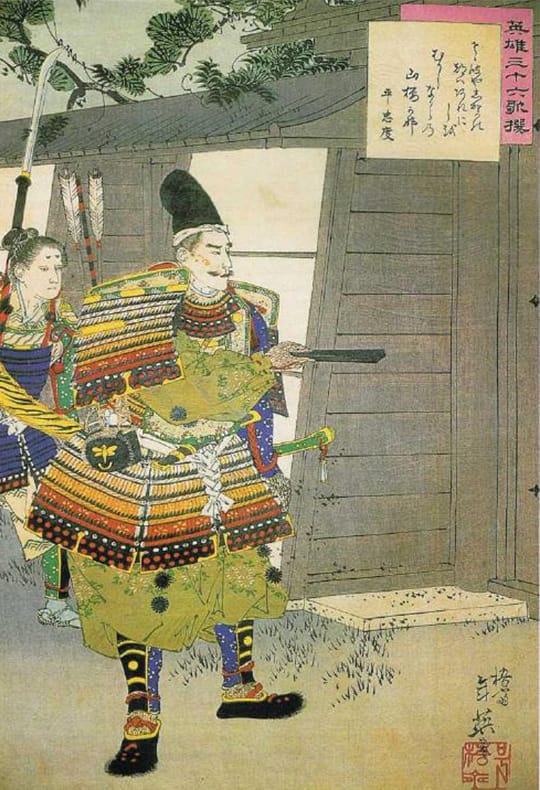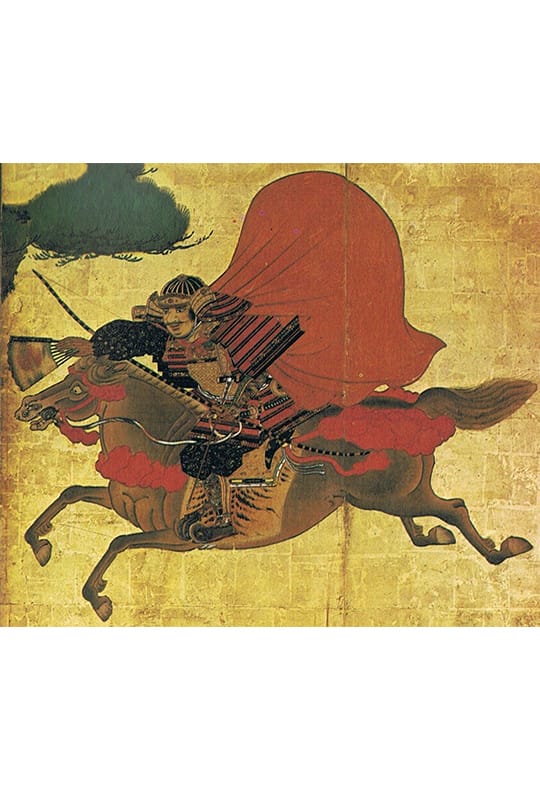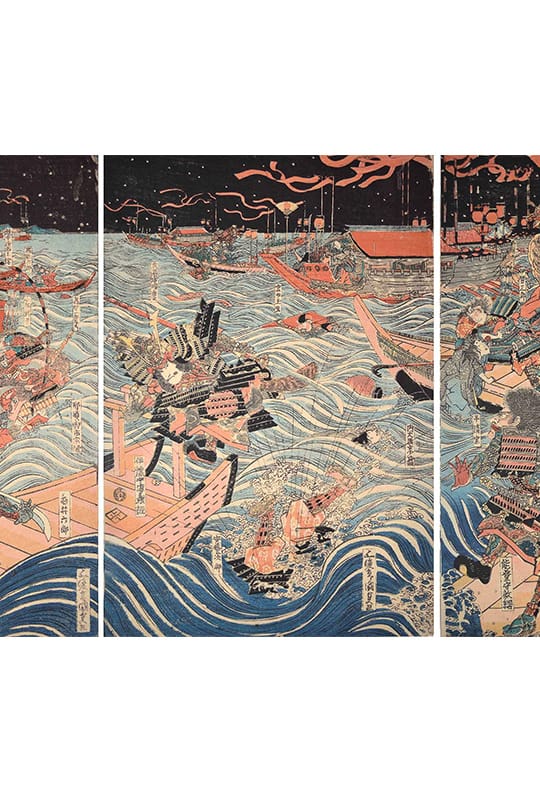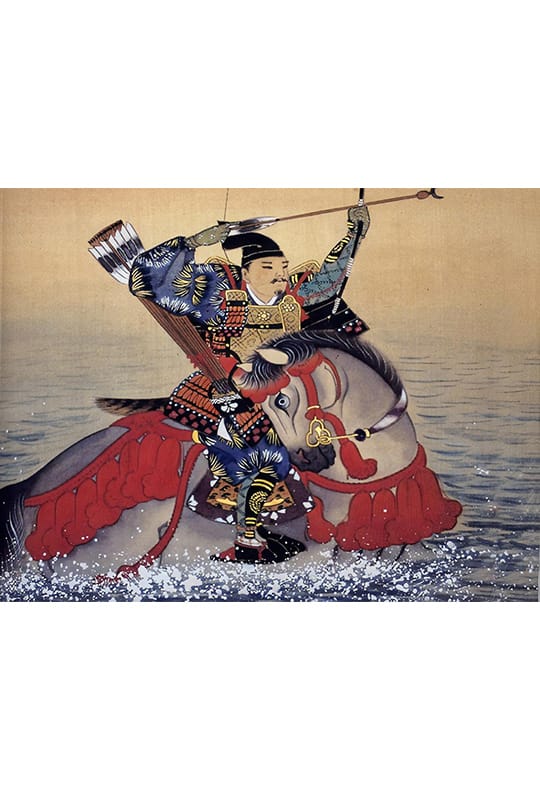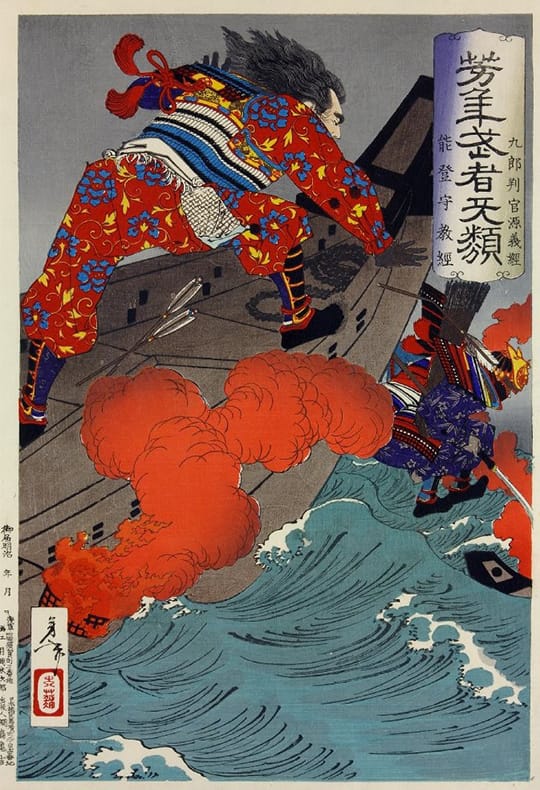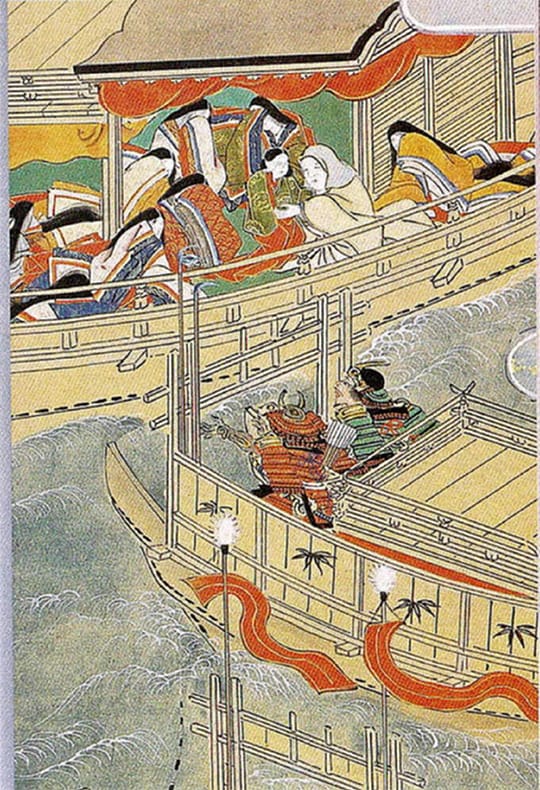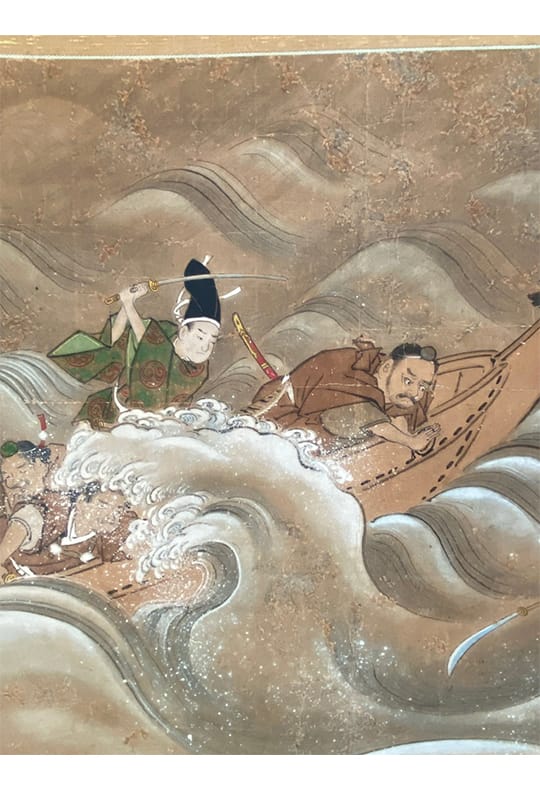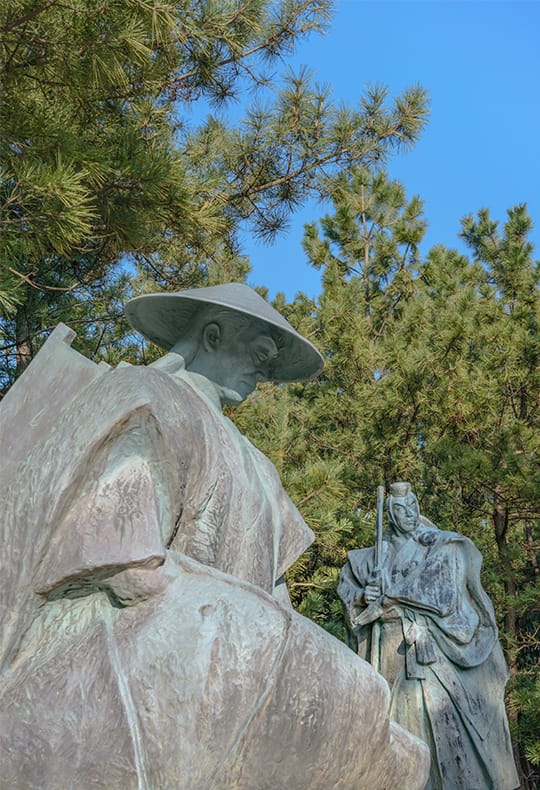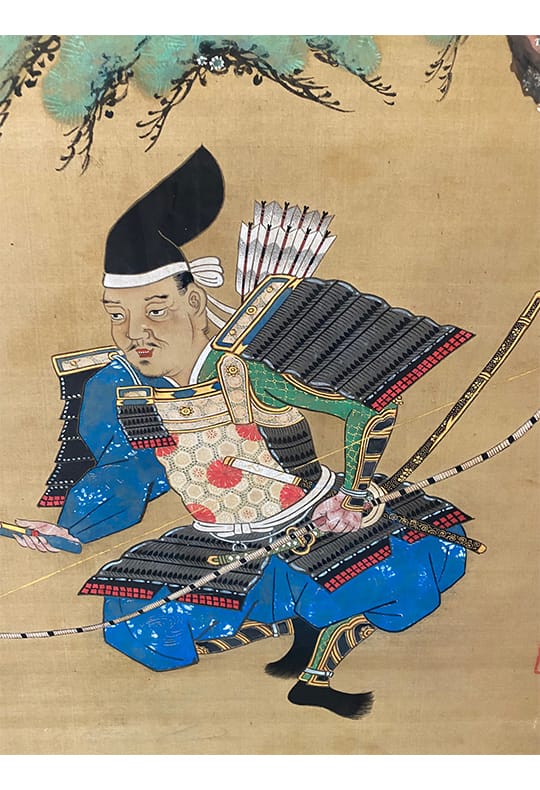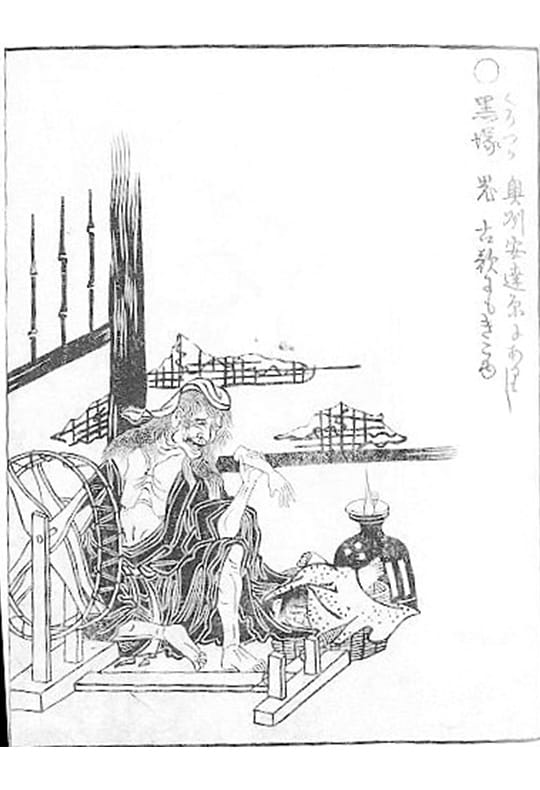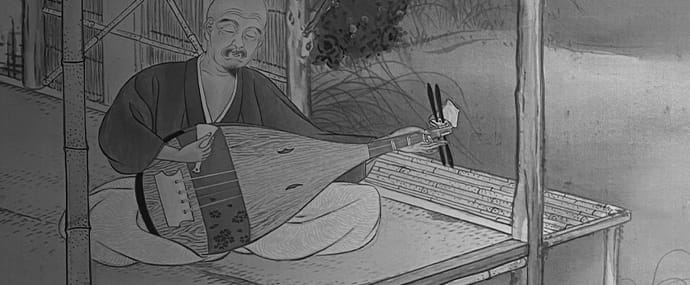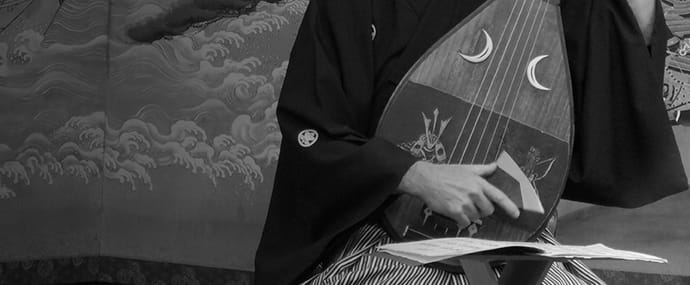
koromogawa
衣川
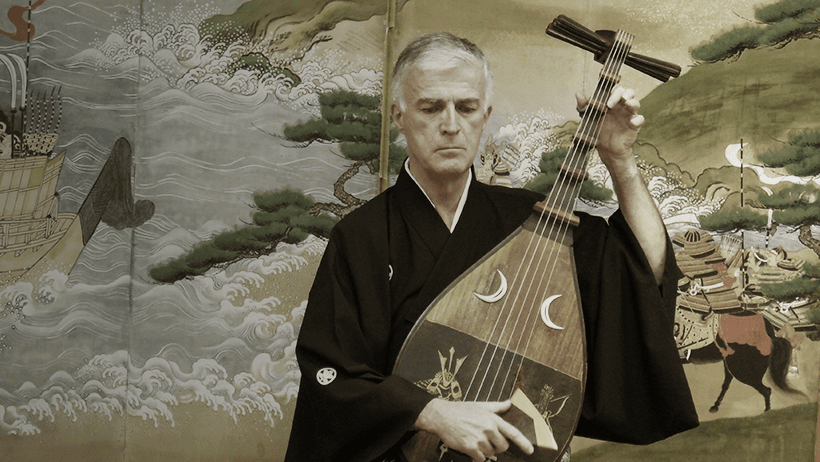
Introduction
After winning the decisive battle against the HEIKE army in 1185 at Dannoura, MINAMOTO no Yoshitsune fled from his elder half-brother Yoritomo, who had established the first shogunate in Kamakura. Despite his brilliant victories, Yoshitsune was the object of slander, which forced him to seek refuge from his pursuers. He found shelter in Hiraizumi (Iwate prefecture) at the residence of FUJIWARA no Hidehira, a confidant of Yoshitsune since his childhood. When he arrived in Hiraizumi in 1187, Yoshitsune was given a mansion on a hill called Takadachiyama close to the Koromogawa River.
Yoshitune’s fate, however, worsened with Hidehira’s death from an illness on the 30th of November the same year. Hidehira’s successor, Yasuhira, succumbed to Yoritomo, and started to turn his back on the refugees. On the 15th of June, 1189 Yasuhira attacked the Takadachiyama mansion with a huge army, forcing Yoshitsune, after a brave fight, to commit suicide at the age of 31.
This last battle of Yoshitsune is told extensively in the Yoshitsune Chronicle (Gikeiki 14th c.). The ballad Koromogawa is primarily based on this source.
Synopsis
Koromogawa is the name of a river in Tōhoku, in Northern Japan. On a hill close to its riverbeds, the last battle of MINAMOTO no Yoshitsune was fought in the early summer of 1189. It was a very uneven fight because Yoshitsune no longer had an army – he was together with his inner circle of a dozen retainers in a mansion called “Takadachiyama” on a small hill. For a while, he had been accepted by his benefactor, FUJIWARA no Hidehira, as a refugee from the persecution of his half-brother, Yoritomo, in Kamakura. When Hidehira, the governor of the Michinoku domain, died, Yoshitsune’s fate changed: the successor, FUJIWARA no Yasuhira, turned against him and attacked with troops of far superior numbers.
When the enemy’s forces approached in the moonlight, Yoshitsune realized that this would be his end. He summoned his retainers for the ritual exchange of a final farewell cup of sake, and rued that they would die in such a miserable place. In the first phase of the battle, Yoshitsune’s men stunned the attacking foe by suddenly bursting out of the mansion and trampling down a fence. For a moment the attackers receded, but they soon returned and killed most of Yoshitsune’s remaining men. When Benkei, the huge warrior monk, saw the inevitable end of this struggle coming, he went inside the mansion and had a last moment with his lord. He wept and Yoshitsune expressed his gratefulness toward his longest serving retainer. Then Yoshitsune asked him a last favor: he had no desire to be killed in the hands of the enemy and instead, preferred the only acceptable end to his life: suicide. When the moment came that he needed to take the life of his wife and his children, and then his own, he wanted Benkei to shield him. After a tearful parting, Benkei stepped outside the mansion and prevented the enemies from entering. Benkei died while still standing, which brought him eternal praise for his loyalty. When the retainer SUGIME Kotarō witnessed this scene, he set fire to the mansion to prevent the enemy forces from dishonoring Yoshitsune further.
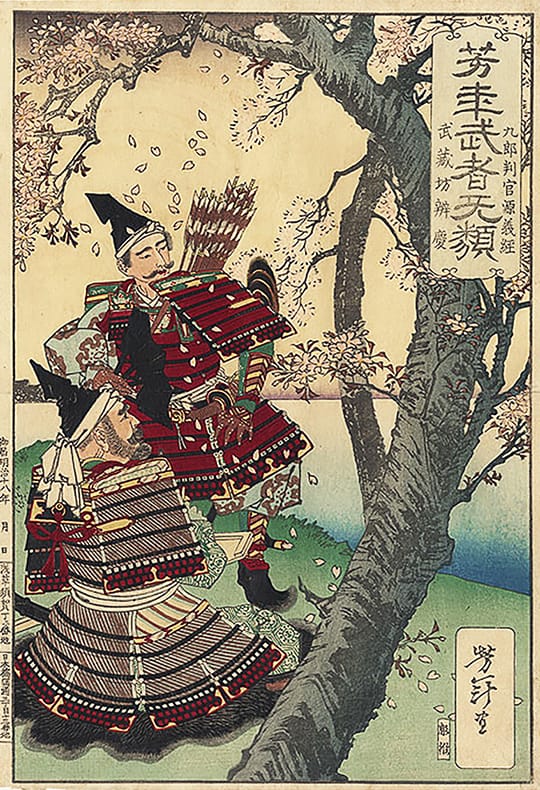
Lyrics
-
1. When gazing upon the moon in the clouds – Schaue ich zum Mond hinauf mit seinen Wolkenschleiern,
Nagamureba kumoi no tsuki 眺むれば雲井の月
-
2. its eternal light is unchanging. sehe ich ein fernes Licht, das niemals sich verändert.
towa no hikari wa kawaranedo 久遠の光はかはらねど
-
3. But in this transient world Ändern tut sich bloß die Welt beständig;
kawari hatetaru yo no sama ni 変り果てたる世の相に
-
4. all dreams of glory pass, leaving only regrets. aller Traum von Glanz vergeht, und nur die Klagen bleiben.
nagori o oshimu eiko no yume 名残を惜む栄枯の夢
-
5. Among the branches of Mt. Takadachiyama’s pines, Auf dem Berg Takadachiyama
Takadachiyama no matsu ga e ni 高館山の松が枝に
-
6. the wind moans. heulen Winde durch die Kiefernzweige.
kaze shōshō to wataruran 風肅々とわたるらん
-
7. Ah, pity poor Yoshitsune, Ach, beklagenswert bist du, Yoshitsune,
itawashiya Yoshitsune kō 悼はしや義経公
-
8. whose great deeds, without equal, Deine Taten brachten dir viel Ruhm und Ehre,
tagui mare naru isaoshi o 類ひ稀なる勲功を
-
9. were sullied by the slander of a faithless retainer. die jedoch ein Schuft von Lehensmann beschmutzte.
fuju no shin ni sokonaware 膚受の臣に害はれ
-
10. Wandering far and wide from the Capital, Yoshitsune musste aus der Hauptstadt fliehen,
miyako o ato ni ochikochi no 都をあとに遠近の
-
11. drifting in the snows, halted by various barriers, lief im Schneegestöber, bis ihm manche Schranken
yuki ni samayoi sekimizu ni 雪に彷徨ひ関水に
-
12. he finally arrived in Michinoku Einhalt boten in der Gegend von Michinoku.
uchi sekaretsutsu Michinoku no うち堰かれつゝ陸奥の
-
13. and sought refuge in a mansion of bygone years. Dort fand er Schutz und Unterschlupf in einem alten Landhaus
hanyū no yado ni kakureshi ga 埴生の宿に隠れしが
-
14. But then his elder confidant Hidehira died, des Beschützers Hidehira. Als dann aber dieser starb,
oji Hidehira ga useshi ato 叔父秀衡が亡せし後
-
15. and like the turning of a linen-spindle, da drehte sich gar schnell des Schicksals Spindel weiter,
mata mo ya meguru odamaki ni 復もや廻る苧環に
-
16. his fate moved back to grief and sorrow brachte nur noch Unglück;
hiun no uki o kurikaeshi 非運の憂を繰返し
-
17. as the wicked successor, Yasuhira, denn der neue Herr, der üble Yasuhira,
fushin no yakara Yasuhira ni 不信の徒輩泰衡に
-
18. turned against him. war Yoshitsune gar schlecht gesinnt.
somukare tamō zo zehi mo naki 背かれ給ふぞ是非もなき
-
19. It was the 5th year of Bunji, the middle of the 5th month, Im 5. Jahr von Bunji (1189), in des fünften Monats Mitte
toki wa Bunji gonen satsuki no nakaba 時は文治五年皐月の半
-
20. and early summer in Michinoku. fing in Michinoku schon der Sommer an.
koko Michinoku wa hatsunatsu no こゝ陸奥は初夏の
-
21. With the sound of the evening bell, Beim Klang der Abendglocke ging die Sonne unter,
hi mo iriai no kane no ne ni 日も入相の鐘の音に
-
22. night approached on the Koromogawa river. während es am Flusse Koromogawa dämmerte.
yagate kureyuku Koromogawa やがて暮れ行く衣川
-
23. Yoshitsune could not but brood over his vassal’s fate. Yoshitsune war verbittert, als er an das Schicksal der Vasallen dachte.
Yoshitsune shūjū no yo o waburu 義経主従の世を佗ぶる
-
24. In the Takadachi Mansion, In dem Takadachi-Landhaus,
Takadachi no yakata ni wa 高館の館には
-
25. they furtively lit their lamps. nur im schwachen Licht von Fackeln,
tomoshibi kasuka ni kakitatete 灯火微かにかき立てゝ
-
26. In all, there were some ten men gathered there. saß er mit dem letzten Dutzend von Getreuen in der Runde.
tsudou wa wazuka jūyonin 集ふは僅か十余人
-
27. Outside, the kuzu leaves fluttered in the breeze. Als es draußen in den Kuzublättern rauschte,
to no mo ni soyogu kuzu no ha ni 外の面に戦ぐ葛の葉に
-
28. They tried to think of their once glorious past, dachten alle stumm an Ruhmestaten der vergangnen Jahre
arishi mukashi no omokage o 在りし往時の面影を
-
29. but, to no avail; their spirits sank in gloom. und versanken dabei immer mehr in hoffnungsloses Brüten –
shinobi mo aede shimeyaka ni 偲びも敢へで湿やかに
-
30. Poor men, they could only wait for morning to come! bis zur frühen Morgenstunde hin – ach wie traurig.
asu o matsu mi zo aware naru 明日を待つ身ぞ哀れなる
-
31. General NAGASAKI Dayūnosuke, was ready to attack. Doch derweilen näherte sich General NAGASAKI Dayūnosuke.
yosete no taishō NAGASAKI Dayūnosuke 寄手の大将長崎太夫輔
-
32. His command, there, among the trees, Vom Wald her führt‘ er eine kleine Truppe und erreichte
tezei o imashime ko no ma yori 手勢を警め木の間より
-
33. in the darkness before the moon rise, noch in dunkler Nacht, bevor der Mond aufging,
tsukinodemae no yoiyami ni 月の出前の宵闇に
-
34. approached the Mansion, das Landhaus Takadachi.
magirete yosuru yakata majika 紛れて寄する館間近
-
35. encircling it, ten, twenty ranks deep. Seine Männer, zehn, ja zwanzig Ringe bildend,
toe hatae ni torimakite 十重廿重に取巻きて
-
36. They suddenly raised their battle cries. kreisten nun die Festung ein und ließen ihren Schlachtruf hören.
dotto toki o zo agetarikeru どっと鯨波をぞ上げたりける
-
37. “Well, here they are!” Benkei shouted, „Hört, da sind sie“ rief nun Benkei laut
suwa koto koso to Benkei ga すわ事こそと弁慶が
-
38. stepping out to the veranda, watching the scene. und trat hinaus auf die Veranda.
en ni tachiide miwataseba 縁に立出で見渡せば
-
39. Down the hill as far as the river’s shore, Oben von den Hügeln her bis hin zum Fluss
oka yori kawara ni uchitsuzuku 丘より河原に打続く
-
40. pennants could clearly be seen in the night. ergoss sich bald ein Strom von Wimpeln,
yome ni mo shiruki hata sashimono 夜目にも著き旗指物
-
41. When the moon of the 16th night rose, die man in der Nacht der Monatsmitte
orishimo noboru izayoi no 折しも昇る十六夜の
-
42. The FUJIWARA men banded in its silvered light. hell im Mondlicht leuchten sah.
tsuki no hikari ni hirugaeru 月の光にひるがへる
-
43. The brave souls inside cried, “There is no time to lose!” Mutig riefen viele: “Los geht’s, keine Zeit verlieren!“
yūyo naraji to ichiza no yūshi 猶予ならじと一座の勇士
-
44. springing up while grabbing their swords. Alle griffen zu den Schwertern und erhoben sich.
katana ottori tachiagaru o 刀おっ取り立ち上るを
-
45. But Yoshitsune held them back a moment, saying, Doch Yoshitsune hielt sie noch für einen Augenblick zurück:
Yoshitsune shibashi to oshishizume 義経暫しと押鎮め
-
46. ”How sorry I am for you, poor warriors. ”Wie leid es mir doch tut um euch, ihr armen Krieger,
muzan ya na mononofu mo 無惨やな武士も
-
47. By following an ill-fated master, einem Herrn zu folgen, dem kein Glück beschieden ist.
hiun no shū ni shitagaite 非運の主に従ひて
-
48. you now find yourselves without a fit place to die. Zu sterben hier ist nicht der Ort für euch Getreue.
shinu ni tokoro o ushinainu 死ぬに処を失ひぬ
-
49. You heroes, who survived, unscathed, In der Hauptstadt hattet ihr als Helden
miyako watari no kassen ni 都わたりの合戦に
-
50. honorable battles in the Capital, schwerste Kämpfe überlebt,
yakizu mo owanu yūshira o 矢傷も負はぬ勇士等を
-
51. must now fall in these desolate summer grasses, doch ruhmlos nun in diesem wüsten Land im Sommergras
na mo naki Yezo no natsugusa ni 名もなき蝦夷の夏草に
-
52. and return your bodies to this soil – how wretched!” den letzten Atemzug zu tun, ist schmerzlich!” sagte er
kabane suwasan fubinsa yo to 屍吸はさん不憫さよと
-
53. Then passing round cups of sake und reichte reihum eine irdne sake-Schale –
kawarake torite tsugitsugi ni 土器取りて次々に
-
54. they made their farewells. alle nahmen voneinander Abschied.
wakare o oshimase tamaikeri 別れを惜ませ給ひけり
-
55. In no time, the enemies’ shouts erupted. Kurz danach schon hörte man die Feinde rufen:
kakaru hima ni mo tekiheidomo かゝる暇にも敵兵共
-
56. ”Just a few left in the house – let’s take it now!” ”Drinnen sind nur wenige, wir wollen’s ihnen zeigen!”
uchi wa kozei zo nottore to 内は小勢ぞ乗っ取れと
-
57. and closed in upon them with a roar. Mit Geschrei und Brüllen rannten sie drauflos.
wameki sakende oshiyosuru 喚き叫んで押寄する
-
58. ”What discourteous fools!” ”Welch ungeschlachtes Pack!” rief Benkei,
ko wa suisan no shiremono to こは推参の痴者と
-
59. said Benkei, the first to head out. schoss hinaus, schnell wie ein Pfeil
Benkei o massaki ni 弁慶を真先に
-
60. Followed by KATAOKA, BINGO, ISE, MASUO, und KATAOKA, BINGO, ISE, MASUO,
KATAOKA BINGO ISE MASUO 片岡備後伊勢増尾
-
61. WASHINO’O, SUGIME and the brothers SUZUKI WASHINO’O, SUGIME und die Brüder SUZUKI
WASHINO’O SUGIME SUZUKI kyōdai 鷲尾杉目鈴木兄弟
-
62. each one of them as brave as the other. standen ihm nicht nach an Kampfeswut.
izure otoranu yūshi no menmen 何れ劣らぬ勇士の面々
-
63. Rushing to the fight, they trampled down the fence Sie stampften wild die Hecke nieder,
ware kara magaki fuminijiri 我れから籬踏み躙り
-
64. and burst through the outer wall. rissen dann den Zaun ein, während sie ins Freie stürmten.
hei uchi yaburite hase izureba 塀うち破りて馳せ出れば
-
65. Taken aback by such valor, Aufgeschreckt von dieser Truppe
sono ikioi ni ojiosore その勢ひに恐ぢ怖れ
-
66. the enemy scattered in all directions. floh zunächst der Feind in alle Winde.
teki wa shihō ni sanran su 敵は 四方に散乱す
-
67. Their own men, battle-hardened warriors, Diese Krieger waren gut geschult,
mikata wa tedare no yūshi nite 味方は手練の勇士にて
-
68. would bravely fight until the very end. sie kämpften bis zum Letzten.
shikamo hisshi o goshitareba 而も必死を期したれば
-
69. Unrelenting, the enemy regrouped, Aber immer wieder nahten neue Feinde,
tekizei ikani muragaru to mo 敵勢いかに群るとも
-
70. and looked like a field of tall grasses bis das Schlachtfeld einer Wiese glich,
miru me wa nobe no aosusuki 見る目は野辺の青薄
-
71. that had never known the edge of a scythe, die niemals eine Sense schnitt.
karitatsu hima mo aragama no 刈り立つ暇も荒鎌の
-
72. fluttering and bending in the wind, Es war wie hohes Gras, vom Wind durchwirbelt,
kaze ni nabikan keshiki nite 風に靡かん景色にて
-
73. a relentless inexhaustible force. wirr, ein Durcheinander ohne Ende.
oitsume kaketsume jūō mujin 追詰駆詰縦横無尽
-
74. The defenders fought desperately to a man, Trotzdem endeten die Kämpfe mit der Zeit,
koko o sendo to tatakaishi ga 茲を先途と戦ひしが
-
75. but they were hopelessly outnumbered; denn allzu übermächtig war der Feind.
shūka tekisezu aitsugite 衆寡敵せず相踵ぎて
-
76. and thus, sadly, they fell, one by one. Es fielen die Getreuen, einer nach dem andern.
uchijini seshi koso itamashikere 討死にせしこそ痛ましけれ
-
77. Even the dauntless, stout-hearted Benkei Gar der wackere Benkei
sasuga gōki no Benkei mo 流石剛気の弁慶も
-
78. suffered heavy wounds and felt his strength waning. hatte tiefe Wunden und war schwach geworden.
sukasho no fukade ni chikara tsuki 数箇所の深傷に力尽き
-
79. ”So, this is the end of it all”, he thought, ”So, das ist das Ende”, dachte er,
mohaya ikusa mo kore made to 最早戦も是までと
-
80. and at last made his way wearily und mit schwerem Schritt
ashi fumishimete yōyō ni 足踏みしめてやうやうに
-
81. to present himself before his lord. trat er vor seinen Herrn Yoshitsune.
kimi no gozen ni makari ide 君の御前に罷り出で
-
82. Bowing formally, halberd grasped for support, Er stützte sich auf seine Lanze und verbeugte sich:
naginata tsue tsuki kashikomite 薙刀杖つき畏みて
-
83. ”I see that our luck is now at its end, ”Das Glück hat Euch verlassen,
ima koso goun no sue to mitatematsuru 今こそ御運の末と見奉る
-
84. so be calm and die in piece, my lord.” findet Ruhe, sterbt in Frieden.”
mikokoro shizuka ni goshōgai o to 御心静かに御生害をと
-
85. In his grief, his heart and voice trembled, Seine Stimme zitterte, sein Herz, es bebte,
koe mo kokoro mo uchifurui 声も心も打ち震ひ
-
86. and tears streamed down his cheeks. ach, es strömten ihm die Tränen über das Gesicht.
harahara to rakurui sureba はらはらと落涙すれば
-
87. Yoshitsune’s voice, too, half-choked with emotion: Mit halberstickter Stimme sprach nun auch Yoshitsune:
Yoshitsune mo koe o urumase tamai 義経も声を潤ませ給ひ
-
88. ”Since our meeting on the Gojō Bridge, so long ago, ”Seit den Zeiten auf der Gojō-Brücke
Gojō no hashi no mukashi yori 五条の橋の既往より
-
89. we have shared joys and sorrows, grief and pleasure. warst du mein Begleiter, teiltest Freud und Leid mit mir.
hiki airaku o tomo ni shite 悲喜哀楽を倶にして
-
90. You have followed me like a shadow, Du hast mich wie ein Schatten stets begleitet,
kage no katachi ni sou gotoku 影の形に添ふ如く
-
91. not once have you left my side. niemals waren wir getrennt.
hanaruru toki wa nakarishi ga 離るゝ時はなかりしが
-
92. And now, until these last moments, only you Es naht die letzte Stunde, und nur du allein
imawa no kiwa nimo nanji nomi 臨終の際にも汝のみ
-
93. have bravely stayed alive with me. bist immer noch an meiner Seite.
nagarae kureshi zo kenage naru 長らへ呉れしぞ健気なる
-
94. Be this the end, do not let these Northern boors Bitte, zeig den Schurken hier im Norden nicht,
saware emishi no yatsubara ni さはれ夷の雑兵輩に
-
95. witness my demise, wie ich die Welt verlasse.
waga shōgai o misen koto 我が生害を見せんこと
-
96. a shameful disgrace I could not bear. Allzu groß wär‘ diese Schmach für mich.
fukaku kono ue arubekarazu 不覚此上あるべからず
-
97. As I shall die soon, by all means Schon bald werd‘ ich gestorben sein, für einen Augenblick nur
tatoi shinutomo ima shibashi たとひ死ぬとも今暫し
-
98. hold them off a little longer!” halte mir die Feinde fern!”
chikatte teki o fusegeyo to 誓って敵を防げよと
-
99. he said sadly to Benkei. sprach er bedrückt zu Benkei.
itawarinagara notamaeba 労りながら宣へば
-
100. ”Of course, Sir!” Benkei replied, ”Dies sei mir Befehl!” und Benkei nickte,
kashikomarinu to unazukitsu 畏りぬと頷首きつ
-
101. and dashed out again to the edge of the garden. machte große Schritte hin zum Garten,
niwasaki ni koso tachiideshi ga 庭先にこそ立ち出でしが
-
102. There he stood, not yielding an inch to his foes, stellte sich beschützend vor Yoshitsune
sono mama ni shite tachisukumi 其儘にして立ち窘み
-
103. and there he died, as simply as one falling asleep. und starb dabei, als wäre er nur plötzlich eingeschlafen.
nemuru ga gotoku usenikeri 眠るが如く亡せにけり
-
104. During this time, Yoshitsune Derweil setzte Yoshitsune – als er die Gewissheit hatte,
Yoshitsune wa kono hima ni 義経はこのひまに
-
105. ensured the deaths of his wife and children. dass schon Frau und Kinder nicht mehr lebten,
saishi no owari o mitodoketsu 妻子の終りを見届けつ
-
106. After thirty-two years, his life ended, 32 jährig – seinem Leben
sanjūnisai o ichigo to shite 三十二歳を一期として
-
107. and he entered the world Beyond. auch ein Ende.
tsui ni goshōgai arasetamō 遂に御生害あらせ給ふ
-
108. SUGIME no Kotarō witnessed this scene, SUGIME no Kotarō war Zeuge,
SUGIME no Kotarō kore o mite 杉目の小太郎之を見て
-
109. And, shedding bitter tears, set fire to the mansion. legte tränenüberströmt das Feuer an das Landhaus.
namida to tomo ni hi o hanateba 涙と共に火を放てば
-
110. Flames like red lotus flowers Riesenflammen schossen auf,
tachimachi noboru guren no honoo 忽ち昇る紅蓮の火焔
-
111. made trees and bushes fall sie griffen auf die Bäume und die Büsche über,
kigi no midori mo yakeochite 樹々の緑も焼け落ちて
-
112. and painted the moon red. so, dass selbst der Mond sich blutrot färbte.
tsuki mo akane ni somarubeshi 月も茜にそまるべし
-
113. The mansion built by the loyal Hidehira – Der getreue Hidehira hatte dieses Haus
gishin ni takeki Hidehira ga 義信に猛き秀衡が
-
114. with sympathy for Yoshitsune – für Yoshitsune liebevoll errichtet,
kokorozukushi no kekkō mo 心づくしの結構も
-
115. turned into rubble and ashes. doch nun fiel es ganz in Schutt und Asche.
aware hai to zo narinikeru 哀れ灰とぞなりにける
-
116. ’Only summer grasses remain as a trace of warriors’ dreams. ’Sommergräser bleiben nur als Spur von Kriegerträumen’.
natsugusa ya tsuwamonodomo ga yume no ato 夏草や武士共が夢の跡
-
117. If you visit the ruins today, Fragen wir nach diesen alten Zeugen heute,
ima mo mukashi no ato toeba 今も既昔の跡訪へば
-
118. only the hidden cuckoos sing in the trees, hören wir nichts als den Kuckuck in den Bäumen rufen,
ko no ma gakure ni hototogisu 樹の間隠れにほとゝぎす
-
119. and the distant sound of a temple bell. und das Hallen einer Tempelglocke von weither.
enji no kane ni hisakata no 遠寺の鐘に久方の
-
120. The skies are now clear over the River Koromogawa. Der klare Himmel spannt sich über den Koromogawa.
sora mo hareyuku Koromogawa 空も晴れ行く衣川
-
121. An everlasting dream which cannot be. Träume bleiben ewig, Träume werden niemals wahr.
mihatenu yume no miegate ni 見果てぬ夢のみえがてに
-
122. Pray for his soul before his mossy grave. So wollen wir beim moosbedeckten Grab für Yoshitsune beten,
koke musu haka o tomurawan 苔生す墓を弔らはん
-
123. Pray for his soul before his mossy grave. wollen wir beim moosbedeckten Grab für seine Seele beten.
koke musu haka o tomurawan 苔生す墓を弔らはん
Notes
5. Takadachiyama… Takadachiyama is the name of a hill close to the Koromogawa river, in the vicinity of Hiraizumi-city, Iwate prefecture. “Taka” means “high” and “dachi” is written with the character for a “residence”. Nowadays, Takadachiyama is a favorite spot where tourists enjoy a lovely view of the Koromogawa river scenery. 12. Michinoku… what is called Michinoku, including the ancient Mutsu province, is nowadays shared by many prefectures of Tōhoku, the northeast of the country. 13. Mansion of bygone years… Yoshitsune had actually spent some years of his childhood in this house. 14. Hidehira… in the Japanese text, Hidehira is called “uncle”, but he was not a relative of Yoshitsune; it is only his guardianship that led to him being called “Yoshitsune’s uncle” FUJIWARA no Hidehira (1122? – 1187) was the third ruler of the Northern FUJIWARA clan in Mutsu province. During the Genpei War, he controlled this territory independently of the central government; however, he was the official imperial governor for the Mutsu Province as of 1181. 15. spindle… This term is related to a popular metaphor for Yoshitsune’s quickly deteriorating fate: a spindle on which a linen thread is wound, which then turns only to lose the thread once again. 17. Yasuhira… Yasuhira (1155-1189) was the eldest son of Hidehira. He felt urged to disclose the whereabouts of Yoshitsune to the ruler of Kamakura. Yoritomo, however, was more interested in the political control and authority of the Mutsu province rather than capturing his brother. Yasuhira, by attacking Yoshitsune, thought to satisfy Yoritomo with Yoshitsune’s death, but Yoritomo considered the crushing of his half-brother an act of disloyalty and had Yasuhira killed in the same year of 1189. With the death of Yasuhira the authority of the FUJIWARA clan over Michinoku came to an end. 19. the 5th year of Bunji …1189. The “middle of the 5th month” cannot be verified. 22. Koromogawa… Koromogawa is a river to the north of Hiraizumi-city. 31. NAGASAKI Dayūnosuke… According to the Yoshitsune Chronicle (Gikeiki) he was a retainer from “the House of Hidehira”. 60. KATAOKA, BINGO, ISE, MASUO… The name BINGO may be a mistake. The correct name was probably BIZEN Heishirō. This retainer, together with KATAOKA Hachirō, ISE Saburō and MASUO Jūrō, was part of the group of Yoshitsune’s closest men until their death. Their names are documented in the Yoshitsune Chronicle. 61. WASHINO’O, SUGIME and the brothers SUZUKI… WASHINO’O Saburō, the brothers SUZUKI Saburō and KAMEI Rokurō are also featured in the Yoshitsune Chronicle as members of the closest retainer-group. SUGIME Kotarō’s name, however, is not documented in this source. In the Edo-period (1603-1867) a legend of Yoshitsune not dying in the Koromogawa battle was fabricated. According to this story Yoshitsune was able to escape and moved to Mongolia (a narrative created in the Meiji-Period 1868-1912), where he changed his name to Ghenghis Khan. SUGIME Kotarō died in the battle as a replacement for Yoshitsune. 88. meeting on the Gojō Bridge… This refers to the first encounter of Benkei and Yoshitune: Benkei, a warrior monk, forcibly collected swords from passersby on the Gojō Bridge, the bridge of the Fifth Avenue over the Kamo River in Kyoto. When young Yoshitsune crossed the bridge joyfully playing his flute, Benkei attacked him too, but was unsuccessful. When he tried to rob Yoshitsune, this young lad was so versatile and quick that Benkei finally gave up and even asked the boy to accept him as a sincere retainer. This bond between Yoshitsune and Benkei lasted until the death of both in the battle of Koromogawa. 103. and there he died, as quietly as one falling asleep… This scene of Benkei shielding Yoshitsune with his huge body is elaborately told in the Yoshitsune Chronicle. Dying in a standing position is the last of many legendary heroic acts of this most loyal retainer. 105. the deaths of his wife and children… According to the Azuma Kagami (c.a. 1300) Yoshitsune was together with his wife and a four-year-old daughter when they died. In the Yoshitsune Chronicle too “wife and children” are mentioned. 106. Here, Yoshitsune’s age is given as 32, but 31 is correct. 116. This line is a quotation from a poem in MATSUO Bashō’s “Oku no Hosomichi” (1702). 118. only cuckoos singing… The cuckoo is a symbol of ‘utmost grief and lament’. It is said that cuckoos cry so intensely that they spill blood from their throat. 119. distant sound of a temple bell… The temple bell reminds everybody of the short span of the human life. The Tale of the Heike starts with the famous lines: “The sound of the Gion Shōja bells echoes the impermanence of all things; […]” (McCullough,1999, p.23).
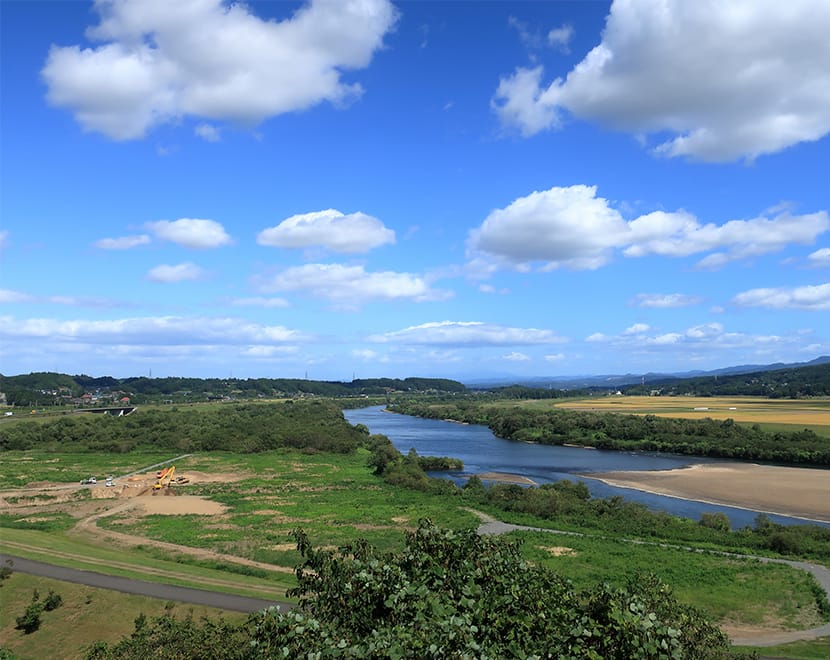
Music Notes
Koromogawa is a lyrical piece, despite two dramatic battle scenes, which is remarkable given that the historically important aspect of the ballad is the topic of Yoshitsune fighting his very last battle. One might expect therefore an exciting music-drama, but the main focus lies on Yoshitsune’s lament.
The emotional setting of the piece may account for the ballad’s opening with Prelude 2. Less than 10 percent of all ballads of the repertoire start with this prelude. Over 80 percent start with Prelude 1, and the remaining 10 percent use preludes of different kinds.
To understand the reason why this rare prelude has been chosen for introducing the story of Yoshitsune’s tragedy requires investigating its musical structure: The prominent Prelude 1 has doubtlessly an invocation quality with the main melody played mostly on the highest 5th string – this prelude has the quality of an exhortative statement: “Now, people listen to what I have to tell you about the great deeds, about the brave heroes who died for the right course!” for example.
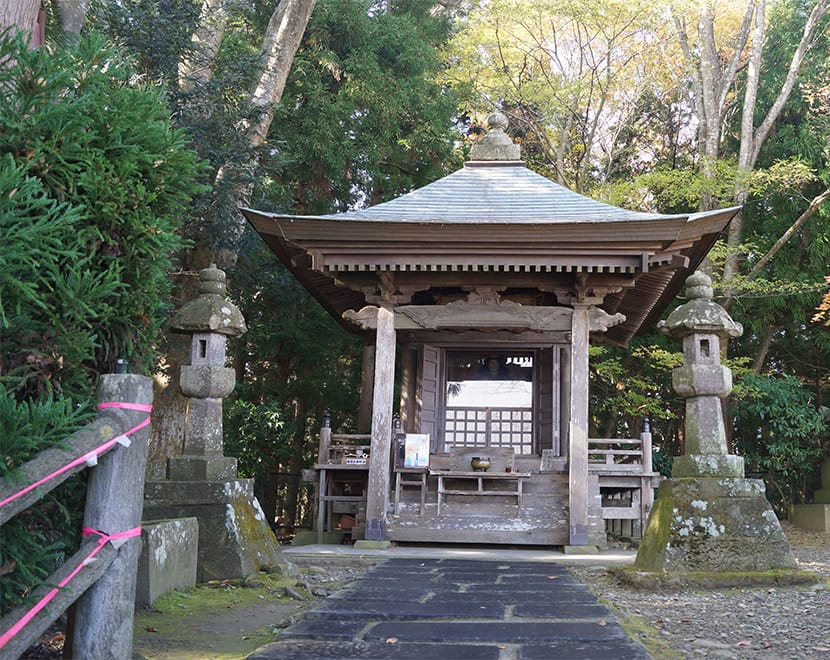
Prelude 2 is less pathetic, and has a more intimate touch created by the prevalence of pitches created on stops of the lower strings. It is actually technically challenging to make this instrumental miniature sound mellow or somber, qualities surely intended by the composer.
This prelude, prepares the audience by creating the appropriate mood for the first thirty sung lines, which are dominated by the melancholy brooding of Yoshitsune in his retreat on Mt. Takadachi. In line 31, the scene abruptly changes when Yoshitsune’s retreat is attacked by a large enemy force. This battle-drama, however, lasts only 10 lines. From line 41, the mood again shifts with the subdued Natsu nagashi (“summer-arioso”), and we listen once again to Yoshitsune’s lamenting. In these passages, he deplores the fate of his closest retainers who will meet their end in this nameless region of Northern Japan. Yoshitsune finally exchanges the cup of farewell with them. Only in the very last moments do the retainers — each one identified by their full name — rush out of the retreat to fight, outnumbered and therefore without success, their foes man to man. But also this scene, where a biwa battle-bravado is appropriate, lasts only 20 lines, and is even interrupted by a poetic full-sized Aki nagashi (“autumn-arioso”).
The last 50 lines of the ballad are filled with melancholic recollections of the past, in recounting how Benkei, the most faithful of retainers, is killed, and how Yoshitsune stabs his wife and his child before committing suicide, thus honorably ending his warrior life by escaping his enemy’s hands.
